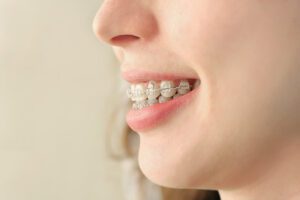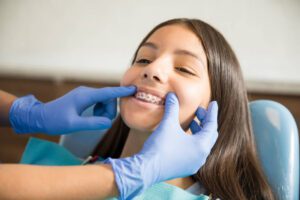Posted on October 24, 2023

Do you struggle with an improper bite? Are you concerned about potential oral health issues? Braces may be the solution you’ve been searching for.
While braces are commonly associated with straightening teeth, they can also have a significant impact on your bite and overall oral health.
Maintaining proper oral health is crucial, but many people overlook the importance of a well-aligned bite.
An improper bite can lead to a range of issues, including jaw pain, difficulty chewing, and even increased chances of tooth decay. Fortunately, braces offer more than just cosmetic benefits.
Braces work by gradually shifting the position of your teeth, not only improving their alignment but also enhancing your bite. By addressing the underlying cause of bite issues, braces can prevent long-term oral health problems.
In this post from Smilebliss, we will explore how braces can help improve your bite and discuss the various oral health benefits they provide.
Maintaining a healthy bite and good oral health is crucial for overall well-being. Poor oral health can lead to various dental problems, such as tooth decay, gum disease, and bad breath. It can also impact a person’s ability to eat, speak, and socialize comfortably.
A healthy bite, or proper alignment of the teeth and jaws, is important for efficient chewing and preventing jaw pain or facial discomfort. Taking care of one’s oral health not only improves the quality of life but also reduces the risk of developing systemic illnesses like heart disease and diabetes.
 Braces serve as a powerful corrective tool, going beyond the cosmetic enhancement of a smile to address fundamental issues of bite alignment and overall oral health.
Braces serve as a powerful corrective tool, going beyond the cosmetic enhancement of a smile to address fundamental issues of bite alignment and overall oral health.
Misaligned teeth or an improper bite can lead to a host of complications, from difficulty in cleaning teeth, resulting in decay and gum disease, to impaired speech and chewing.
Braces work by applying consistent pressure to gradually shift teeth, rectifying issues such as overbite, underbite, crossbite, and open bite.
These corrections are pivotal in preventing the domino effect of oral health problems that can develop over time, including jaw strain, sleep issues, and uneven wear on teeth.
By investing in braces, individuals are not only committing to the aesthetic appeal of a straight smile but also to a foundational restructuring that safeguards their oral health, ensuring functionality and resilience for years to come.
Orthodontic brace treatment is a common solution for various bite problems that individuals may face. These problems can arise due to genetics, misaligned teeth, or even habits like thumb-sucking. The good news is that orthodontic braces can correct them and bring about a positive change in your smile and overall oral health.
Here are some common bite problems that orthodontic brace treatment can correct:
An overbite occurs when the upper front teeth overlap significantly with the lower front teeth. This can cause unnecessary strain on the jaw joint, lead to tooth wear, and even affect speech. Orthodontic braces can gradually push the upper teeth back and align them with the lower teeth, correcting the overbite.
An underbite is the opposite of an overbite. It happens when the lower teeth protrude further in front than the upper teeth. This misalignment can cause difficulty chewing, speech problems, and jaw pain. Orthodontic braces can help realign the teeth and jaw, ensuring a proper bite.
A crossbite occurs when the upper teeth sit inside the lower teeth when biting down. It can affect the appearance of the smile and put pressure on the jawbone, potentially leading to misalignment of the jaw. Orthodontic treatment, including braces, can correct crossbites by moving the teeth into their proper positions.
An open bite is when the upper and lower front teeth do not meet when the jaw is closed. This can cause speech difficulties and chewing problems. Orthodontic braces can gradually close the open bite by moving the teeth into the correct alignment.
Crowding occurs when there isn’t enough space in the mouth for all the teeth to fit properly. Spacing, on the other hand, refers to gaps between teeth.
Both crowding and spacing problems can lead to difficulties in maintaining proper oral hygiene and can affect the overall appearance of the smile. Orthodontic braces can help align the teeth correctly, eliminating crowding or closing gaps.
By correcting bite issues with braces, you can experience several benefits:
 Maintaining good oral health is incredibly important during this time to ensure the success of your orthodontic brace treatment and to prevent any potential complications.
Maintaining good oral health is incredibly important during this time to ensure the success of your orthodontic brace treatment and to prevent any potential complications.
Here are some essential tips on how to maintain oral health during braces treatment:
With braces, it’s crucial to brush your teeth more frequently and thoroughly than before. Aim to brush after every meal or snack to remove any food particles that can get stuck in your braces.
Use a soft-bristle toothbrush and brush at a 45-degree angle to clean the brackets and wires effectively. Don’t forget to brush the chewing surfaces of your teeth as well.
Regular flossing becomes more challenging with braces, but it’s still essential. Use a floss threader or an interdental brush to effectively clean between the wires and around the brackets.
Gently maneuver the floss or brush to remove any trapped food particles or plaque. Flossing should be done at least once a day, preferably before bedtime.
To further ensure your oral health during braces treatment, incorporate an antimicrobial mouthwash into your daily routine.
Rinse with the mouthwash for 30 seconds after brushing and flossing to kill any remaining bacteria and reduce the risk of gum inflammation or infections. Choose a mouthwash that is alcohol-free to avoid any potential irritation.
While wearing braces, it’s crucial to avoid hard and sticky foods that can damage the brackets or wires. These foods include caramel, popcorn, nuts, crunchy vegetables, and chewing gum.
Opt for softer alternatives and cut your food into smaller pieces to make eating more comfortable and prevent any damage to your braces.
Regular dental check-ups are even more necessary during braces treatment. Schedule regular visits with your orthodontist or dentist to ensure that your braces are working correctly and to address any issues or concerns.
They will be able to detect any areas that require extra attention and provide guidance on maintaining optimum oral health.
If you participate in physical activities or sports, it’s crucial to wear a mouthguard to protect your braces and teeth from any potential impact or injury. Consult with your orthodontist to get a custom-fitted mouthguard that will provide the best protection and comfort.
Braces are an essential tool for improving one’s bite and preventing oral health issues. By properly aligning the teeth and jaw, braces can correct misalignment and overcrowding, leading to a more harmonious bite.
Braces can prevent the development of oral health issues such as tooth decay, gum disease, and TMJ disorders. With proper orthodontic treatment, individuals can achieve a healthy and functional bite, enhancing their overall oral health and well-being.
Ready to embark on a journey toward a healthier smile? Trust Smilebliss, where your optimal oral health is our dedicated mission. Reach out to us today and take the first step towards a confident, healthy future.